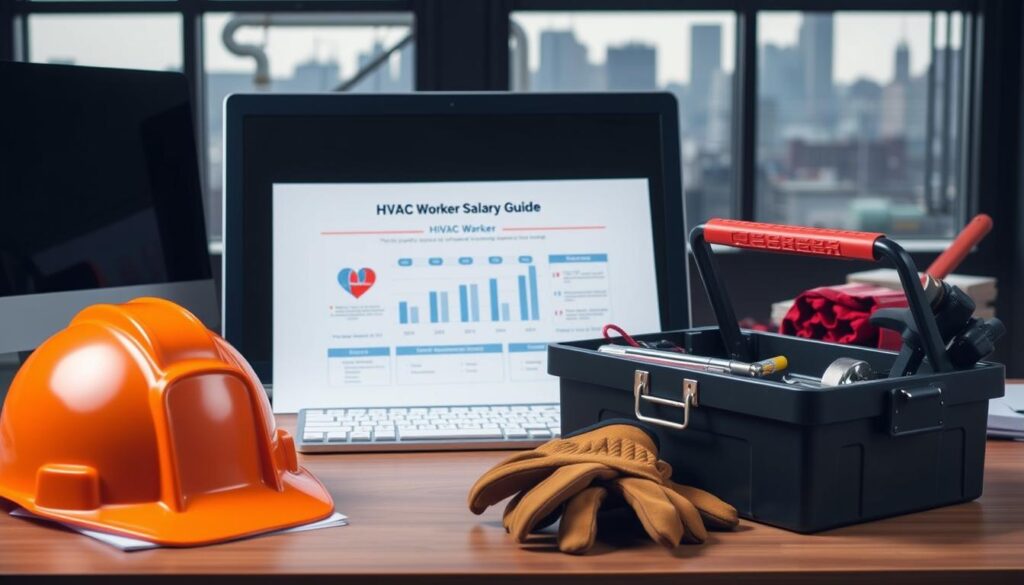Affiliate Disclosure
HVAC Guide Guys is a participant in the Amazon Services LLC Associates Program, an affiliate advertising program designed to provide a means for sites to earn advertising fees by advertising and linking to Amazon.
How Much Do HVAC Workers Get Paid? Ever wondered how much HVAC workers make in today’s job market? The heating, ventilation, and air conditioning field offers surprising pay that might surprise you.

Exploring HVAC worker salaries, you’ll find a career with big earning chances. The Bureau of Labor Statistics shows HVAC salaries are going up. This is because there’s a growing need for skilled technicians in the U.S.
Your career in HVAC isn’t just about money. It’s about a stable, fulfilling job. HVAC pros are key in keeping places comfy and efficient, from homes to big buildings.
Key Takeaways
- HVAC careers offer competitive salary ranges
- Median annual wages exceed $48,000
- Multiple factors influence HVAC worker compensation
- Career growth is significant
- Technical skills boost earning power
Table of Contents
Understanding HVAC Worker Compensation Basics
Exploring HVAC technician wages shows a complex world of pay. Your income as an HVAC pro depends on many important factors. These factors shape your earning power.
Looking into hvac installer pay, you see it’s more than just hourly rates. The total pay includes several key parts. These parts help figure out your financial future in this field.
Base Salary Foundations
HVAC technician wages have several main parts:
- Hourly base rate
- Overtime compensation
- Specialized skill premiums
- Performance-based incentives
Critical Factors Influencing Pay Rates
Your earnings are influenced by several key factors:
- Professional Experience: Newbies start lower, while veterans earn more
- Geographic Location: Cities usually pay more
- Certification Levels: Higher certifications mean higher pay
- Specialization Areas: Commercial work pays differently than residential
Industry Compensation Benchmarks
Knowing standard pay ranges helps HVAC pros set career goals. Most technicians see their wages grow as they gain experience and skills.
Growing in HVAC isn’t just about technical skills—it’s about career strategy and knowing your worth.
National Average HVAC Technician Salaries
Starting your HVAC career means understanding the national salary range. HVAC technicians earn different amounts based on experience, location, and specialty. This is key to knowing your earning possibilities.
The average salary for HVAC technicians falls between $46,000 and $68,000 a year. This range shows the importance of their technical skills in the HVAC field.
- Entry-level technicians: $35,000 – $48,000
- Mid-career professionals: $50,000 – $65,000
- Experienced specialists: $65,000 – $82,000
Your salary can increase with more certifications, skills, and experience. This is a big part of growing your income in the field.
| Experience Level | Typical Annual Salary | Potential Growth |
|---|---|---|
| 0-2 Years | $35,000 – $48,000 | Initial training phase |
| 3-5 Years | $50,000 – $65,000 | Skills development |
| 6+ Years | $65,000 – $82,000 | Advanced specialization |
Pro tip: Invest in continuous learning and advanced certifications to maximize your hvac career earnings.
The HVAC industry offers stable and competitive compensation for skilled professionals willing to develop their expertise.
Explore Our HVAC Shop
Looking for top-rated HVAC tools, parts, and accessories? Visit our shop and find the perfect solution for your needs.
Visit the ShopHow Much Do HVAC Workers Get Paid in Different States
HVAC worker salaries vary a lot from state to state. Your pay can change based on where you live, local job needs, and the economy. Let’s look at how much HVAC workers make across the country.
Highest Paying States for HVAC Professionals
Some states pay HVAC workers more than others. The highest paying states are:
- California: Highest average salaries due to high cost of living and strong demand
- New Jersey: Competitive wages driven by dense urban infrastructure
- Washington: Tech-driven economy supports higher HVAC worker pay rates
- Massachusetts: Strong industrial and residential HVAC markets
- Alaska: Unique climate conditions driving specialized HVAC needs
Lowest Paying States for HVAC Workers
States with less economic activity and smaller construction markets pay HVAC workers less:
- Arkansas: Limited industrial development
- Mississippi: Lower cost of living impacts wages
- West Virginia: Reduced infrastructure investment
- Alabama: Smaller urban centers
- South Dakota: Limited economic opportunities
Regional Salary Variations
Your earnings can change based on where you are. Cities usually pay more than rural areas. Coastal and big city states often have better job opportunities for HVAC workers.
| Region | Average Annual Salary | Job Demand |
|---|---|---|
| Northeast | $58,000 – $72,000 | High |
| West Coast | $62,000 – $78,000 | Very High |
| Midwest | $50,000 – $65,000 | Moderate |
| Southern States | $45,000 – $55,000 | Growing |
Top-Paying Cities for HVAC Professionals

Location is key when it comes to earning in the HVAC field. Some cities pay HVAC contractors much more than others. This makes where you work a big part of your career plan.
San Francisco, New York City, and Newark are the best places for HVAC pros to make good money. These cities have high salaries because of their demand, complex systems, and high cost of living.
- San Francisco: Highest average salary range of $64,200
- New York City: Competitive wages around $62,500
- Newark, NJ: Strong regional market with salaries near $59,900
Your salary in these cities depends on a few important things:
- Local economic conditions
- Industry demand
- Complexity of HVAC systems
- Specialized technical skills
Tip: Consider additional certifications and specialized training to maximize your income in these cities.
“Location can significantly impact your HVAC career earnings – choose wisely!” – HVAC Industry Expert
Explore Our HVAC Shop
Looking for top-rated HVAC tools, parts, and accessories? Visit our shop and find the perfect solution for your needs.
Visit the ShopExperience Levels and Salary Progression
Your HVAC career journey is linked to your growth and experience. Knowing how hvac salaries change can help you plan your career. This way, you can make the most of your earning opportunities.
Entry-Level Opportunities
Starting in HVAC, entry-level technicians make between $30,000 and $45,000 a year. These wages show the basic skills you’ll learn through:
- Apprenticeship programs
- Technical school training
- On-the-job learning experiences
“Your first years are key for building technical skills and professional networks.” – HVAC Industry Expert
Mid-Career Earnings
With 5-10 years of experience, your hvac salary can jump up. Mid-career technicians with special certifications and skills can make $50,000 to $65,000 a year.
Senior Level Compensation
Experienced HVAC pros with over 10 years earn well. Senior technicians, in management or special roles, can make up to $75,000 or more.
- Advanced certifications boost earning power
- Specializing in commercial or industrial HVAC systems
- Potential for business ownership or senior management roles
Investing in continuous learning and skill development is key to advancing your HVAC career and increasing your earnings.
Commercial vs Residential HVAC Salaries
When looking at hvac installer pay, it’s key to know the difference between commercial and residential sectors. Salaries vary a lot between these two HVAC areas.
Commercial HVAC techs usually earn more because of the complex industrial systems they work with. Your hvac repair income can change a lot based on whether you work in commercial or residential HVAC.
- Commercial HVAC systems are more complex and need advanced skills
- Residential work involves smaller installations and maintenance
- Getting specialized certifications can boost your earnings in both areas
Looking at salaries gives us some interesting facts about each sector’s pay:
| HVAC Sector | Average Annual Salary | Skill Complexity |
|---|---|---|
| Commercial HVAC | $65,000 – $85,000 | High |
| Residential HVAC | $50,000 – $70,000 | Medium |
Choosing between commercial and residential HVAC can shape your HVAC career. Commercial work offers technical challenges and better pay. Residential HVAC provides steady hours and a chance to connect with the community.
Professional growth depends on continuous learning and adapting to HVAC system tech advancements.
In the end, both commercial and residential HVAC careers are stable and fulfilling for skilled technicians. They need to keep learning and growing in their field.
Explore Our HVAC Shop
Looking for top-rated HVAC tools, parts, and accessories? Visit our shop and find the perfect solution for your needs.
Visit the ShopBenefits and Additional Compensation
HVAC pros get more than just good pay. They also get great benefits that boost their earnings. Knowing these perks can help you choose the best HVAC career path.
Top HVAC companies know how valuable skilled workers are. They offer great pay and benefits to keep the best talent. These extras are key to your overall earnings in the HVAC trade.
Health Insurance Options
Good HVAC companies give strong health insurance. You can expect:
- Medical insurance with low deductibles
- Dental and vision coverage
- Prescription drug plans
- Preventative care options
Retirement Planning
Retirement plans are vital for HVAC workers’ future. Many employers offer:
- 401(k) retirement savings plans
- Company matching contributions
- Investment advisory services
Performance Bonuses
Your hard work and skills can lead to big rewards. Bonuses can include:
| Bonus Type | Potential Earnings |
|---|---|
| Annual Performance Bonus | $500 – $5,000 |
| Customer Satisfaction Incentives | $250 – $2,500 |
| Referral Bonuses | $100 – $1,000 |
Pro tip: Always negotiate your total compensation package, not just your base salary. The right benefits can substantially increase your overall earnings in the HVAC industry.
Explore Our HVAC Shop
Looking for top-rated HVAC tools, parts, and accessories? Visit our shop and find the perfect solution for your needs.
Visit the ShopCareer Growth and Salary Advancement

Boosting your income in the HVAC field is possible with career growth. The hvac industry offers many ways to increase your earnings. By planning and learning, you can turn a starting job into a high-paying career.
To increase your hvac income, follow these important steps:
- Pursue advanced technical certifications
- Specialize in high-demand system technologies
- Develop management and leadership skills
- Explore entrepreneurial opportunities
Choosing a specialty can greatly raise your earnings. Energy-efficient systems and commercial HVAC are in high demand and pay well. Those who learn about complex systems earn more than those working on homes.
Here’s how your career might grow:
- Entry-level technician
- Specialized technician
- Senior technician
- Field supervisor
- Operations manager
- Independent business owner
Staying committed to learning and growing will help you earn more in the HVAC field. Keep up with new technologies and get more certifications to advance your salary.
Industry Trends Affecting HVAC Wages
The HVAC industry is changing fast, affecting hvac salaries and contractor pay rates. New technologies and market needs are changing how much skilled workers get paid.
Several key trends are driving changes in the industry:
- Smart home technology integration
- Growing demand for energy-efficient systems
- Sustainable heating and cooling solutions
- Increased focus on advanced technical skills
The Bureau of Labor Statistics says the HVAC sector will grow by 40,100 jobs by 2033. This growth means wages for technicians might go up. Those with the latest skills will likely earn more.
New specializations are opening up for HVAC workers. Green technology and smart system installations are key skills that can raise earnings. Contractors who keep up with these changes can earn more in a competitive market.
Economic factors and construction trends also affect HVAC wages. As buildings get more complex and energy rules get stricter, the need for skilled HVAC workers will grow. This will likely lead to higher pay for contractors.
Explore Our HVAC Shop
Looking for top-rated HVAC tools, parts, and accessories? Visit our shop and find the perfect solution for your needs.
Visit the ShopComparison with Other Trade Professions
When looking at how much HVAC workers earn, it’s key to see how they compare to others. HVAC wages are competitive with electricians, plumbers, and construction workers.
Trade jobs often have similar pay structures. A career in HVAC can be as rewarding as other skilled trades.
Electrician Salary Comparison
Electricians and HVAC techs have similar career paths. Their salaries show they earn about the same:
- Starting jobs pay $35,000-$45,000
- More experienced workers make $65,000-$85,000 a year
- Certifications can increase earnings
Plumber Wage Analysis
Plumbing jobs have similar pay to HVAC. Both fields offer competitive wages based on skill and location.
| Trade Profession | Entry-Level Salary | Experienced Salary |
|---|---|---|
| HVAC Technician | $40,000 | $75,000 |
| Plumber | $38,000 | $72,000 |
| Electrician | $42,000 | $80,000 |
Construction Trade Benchmarks
Your chances in HVAC are good compared to other construction jobs. Skills, learning, and specialization can boost your pay.
- Special training raises your value
- Where you work affects your pay
- Certifications can open up better jobs
Remember, your career growth depends on skill development, reputation, and adapting to new HVAC technologies.
Conclusion
The HVAC profession is both exciting and rewarding. It offers a chance to grow your earnings as you gain experience. You can start in entry-level roles and move up to more advanced positions.
To increase your earnings, make smart choices. Consider getting more certifications or focusing on commercial HVAC systems. Also, keep up with new technologies. The best technicians keep learning and adapting.
Your future in HVAC looks bright. There’s a growing need for skilled technicians. With ongoing projects and energy efficiency efforts, the job market is strong. Focus on growing professionally and providing quality service to build a successful career.
Stay proactive and adaptable to succeed in HVAC. Your hard work and knowledge of market trends will drive your growth. This dedication will help you thrive in the HVAC sector.

